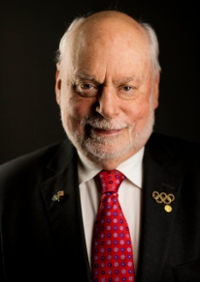Sir J. Fraser Stoddart
Board of Trustees Professor in Chemistry, Director for the Center for the Chemistry of Integrated Systems, Northwestern University, and 2016 Nobel Prize Winner in Chemistry
"Mingling Art with Science "
8:00 PM Monday, April 23, 2018
UC Ballroom
"The Rise and Promise of the Mechanical Bond in Chemistry and Beyond"
3:00 PM Monday, April 23, 2018
GBB 123
Please join us for a seminar and lecture with Sir J. Fraser Stoddart. After receiving his Ph.D. in 1966 from Edinburgh University, he held appointments at Queen’s University, Sheffield University, UCLA, Birmingham University, and the California NanoSystems Institute before being named to a chair at Northwestern University. One of the most famous research scientists in the world, he was the first to synthesize successfully a mechanically interlocked molecule, known as a catenane, thereby helping to establish the field of mechanical bond chemistry. His research has led to the creation of molecular computers that are much smaller and potentially more powerful than today’s silicon-based machines. Catenanes have a wide range of applications, including as components of drug-delivery systems, electronic sensors, and motorized devices. He has been a pioneer in using molecular recognition and self-assembly processes for the fabrication of new electronic devices and NanoElectroMechanical Systems.
Professor Stoddart’s work has been recognized with many awards, including the American Chemical Society’s Cope Scholar Award (1999), the Nagoya Gold Medal in Organic Chemistry (2004), the Albert Einstein World Award of Science (2007), and the Royal Society’s Davy Medal (2008). He was one of twenty research scientists to be invited by the Royal Swedish Academy of Sciences to participate in the Nobel Jubilee Symposium on “Frontiers of Molecular Sciences” in Stockholm in December 2001. He was appointed by Her Majesty Queen Elizabeth II as a Knight Bachelor in her 2007 New Year’s Honours List for his services to chemistry and molecular nanotechnology. He received the Nobel Prize in Chemistry in 2016 for his work in the design and production of molecular machines and shared the prize that year with French chemist Jean-Pierre Sauvage and Dutch chemist Bernard Feringa. Professor Stoddart holds five honorary degrees, sits on the international advisory boards of numerous scientific journals, edits Applied Nanoscience, and is a fellow of prestigious scientific societies in the United States, Germany, the United Kingdom, and the Netherlands.
A measure of Professor Stoddart’s impact as a scientist can be gained from the record of his citation statistics. Of his more than 1,000 publications, 3 of them have been cited over 1,000 times, 15 over 500, 27 over 300, 157 over 100, and 335 over 50. In his 45-year career, more than 400 Ph.D. and postdoctoral students have passed through his laboratories and been inspired by his imagination and creativity. A powerful spokesman for the values and methods of science, he has given more than 1,000 plenaries and invited lectures all over the world.
In addition, that evening at 8:00 in the University Center Ballroom, Professor Stoddart will give the Lucile Speer Memorial Lecture: “Mingling Art with Science.”
